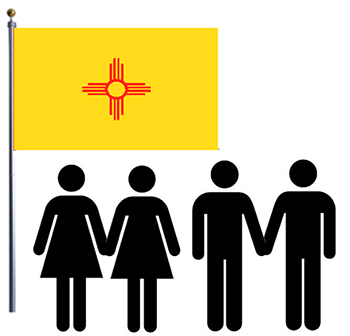
On December 19, New Mexico’s Supreme Court rendered its 5-0 decision that denying same-sex couples the right to engage in civil marriage is unconstitutional. This was an early Christmas present for the hundreds of lesbian and gay couples throughout the state who got their licenses from the six brave county clerks who began issuing them last August, for the thousands more who have been waiting for state-wide approval, and to our many supporters of all sexual identities who believe in equal rights for all.
Two days later Utah followed suit. Once overwhelmingly Mormon and still predominantly so, this was a noteworthy addition to the states that had already taken the progressive step. Not too many years ago, the Mormon Church provided an extraordinary amount of money to pass Proposition 8 in California, hoping to close down same-sex marriage in that state. It worked for a while, until the highest California Court restored a right that had been toyed with far too long. Mormon officialdom has, of course, come out against the Utah decision. But there is evidence that even that very conservative religious configuration understands that equal rights under the law are the way of the future—at least in the area of marriage.
A day after Utah, Hawaii began marrying its gay citizens; it had previously passed a marriage equality law. As each state moves forward, more and more gay and lesbian citizens receive the social and economic advantages implicit in these rulings: inheritance, social security benefits, partnership rights in cases of illness and end of life decisions, and so much else.
Although slow in comparison with other countries, 18 of our 50 states and the District of Colombia now treat their homosexual citizens with integrity. Their combined citizenry represents approximately 40% of our population. Gay citizens raise children, own property, work, pay taxes, hold public office, serve in our armed forces, occupy positions of importance in many of our religious and spiritual bodies, and in every other way—recognized or not—participate in the public life and private fabric of our nation. When we can legally marry, we also prove profitable to many in the tourism, catering and floral industries; states that are popular wedding and honeymoon destinations have raked in dollars in a time of lingering economic crisis.
Among us, there are politicians who have been voted from office because of their support for marriage equality. There are priests and ministers who have been drummed out of their congregations, such as the recent case of the Methodist minister who was defrocked after officiating at the marriage of his gay son. And there are numerous gay and lesbian couples across the country that have taken on the often uncomfortable and time-consuming task of suing city and state authorities for the right to marry. We should not forget these heroes. Their willingness to stand up and be counted makes it easier for those who come later.
I hope President Obama and/or the US Supreme Court will soon issue a nationwide decision that will put the United States on a par with The Netherlands (2001), Belgium (2003), Spain (2005), Canada (2005), South Africa (2006), Norway (2009), Sweden (2009), Portugal (2010), Iceland (2010), Argentina (2010), Denmark (2012), France (2013), Uruguay (2013), and New Zealand (2013); and with Brazil, England, and Wales which are poised to follow suit. All these countries afford their gay citizens equal marriage rights. Some of them have deeply entrenched religious reasons for denying “the sanctity of marriage” except in the case of one man and one woman. But even they have seen the future.
At the same time, as we celebrate our victories we must not forget our sisters and brothers throughout the world who live in countries where homosexuality is cruelly punished, sometimes by death. Several African countries fall into this category. A particularly harsh law was recently passed in Uganda. No Asian country yet has marriage equality, and gay men and women suffer terribly in some. Just this month India strengthened its anti-gay laws. Fundamentalist religious beliefs—whether Hindu, Muslim, Christian, or of another stripe—are almost always behind such intolerance. It behooves us to remember, with the poet John Donne, that
No man is an island,
Entire of itself.
Each is a piece of the continent,
A part of the main.
If a clod be washed away by the sea,
Europe is the less.
As well as if a promontory were.
As well as if a manner of thine own
Or of thine friend's were.
Each man's death diminishes me,
For I am involved in mankind.
Therefore, send not to know
For whom the bell tolls,
It tolls for thee.
I would substitute “human” for “man,” “humankind” for “mankind,” and “the world” for “Europe.” And as I revel in our recent victories and anticipate those to come, I keep the brutalized sexually different citizen of Uganda in my heart.
(Image by Mike Licht)

December 23, 2013